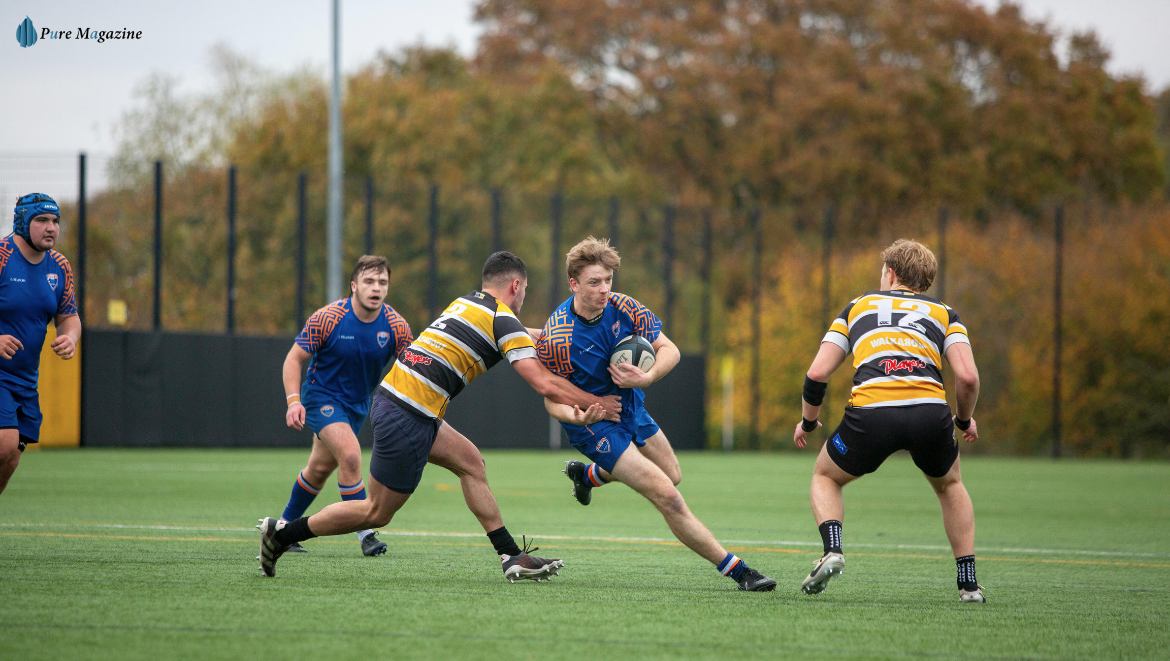Imagine this: the stadium lights are blazing, fans are roaring, the teams line up, and you’re locked in with snacks at your side. The whistle blows—and you suddenly wonder, “Wait, how long is a rugby game?”
Here’s the short version: rugby matches are built around 80 minutes of playing time. But if you’re expecting a neat in-and-out like a sitcom episode, think again. Between scrums that take forever, injuries that stop everyone in their tracks, and the drama of extra plays after the clock hits 80, you’re usually in for closer to 90–100 minutes of action.
Now let’s really peel it open.
Rugby Union: The Classic 80-Minute Campaign
Rugby Union is the version you see at the World Cup.
- Two halves, 40 minutes each.
- A halftime break that lasts around 10–15 minutes.
- A clock that mostly keeps ticking, unless the ref decides otherwise.
On paper, simple. But rugby doesn’t care about your stopwatch. The final whistle only blows when the ball goes dead. So if a team is charging down the field in the 80th minute, the tension stretches like sudden-death overtime in a video game. You’re stuck holding your breath until something finally cracks.
Professional games often run longer thanks to television match official (TMO) reviews, scrums that collapse and reset, and penalty discussions. If you’re watching at home, expect it to run closer to two hours.
Rugby League: Same Length, Faster Pace
Rugby League keeps the 40+40 setup, but the vibe is different. The six-tackle rule forces quicker decisions and faster play-the-ball resets. Less faffing around with scrums, more open bursts of action.
It’s still 80 minutes, but it feels snappier. Like the difference between grinding through a long RPG and blasting through an arcade shooter—the time’s the same, but the rhythm changes everything.
Rugby Sevens: The Speed-Run Mode
Sevens is rugby on fast-forward.
- 7 players per side.
- 7 minutes per half.
- Just 2 minutes for halftime.
That’s 14 minutes total. You could literally heat up a pizza and miss the entire match.
The field stays the same size as Union, but with fewer players, which means massive open space. It’s breakneck. You get explosive tries, end-to-end runs, and a pace that feels almost unreal.
At big events like the Hong Kong Sevens, matches roll one after another all day long. It’s less like one long movie and more like a highlight reel on loop.
School & College Rugby: Shorter Matches, Same Heart
Youth rugby trims things down to match player stamina and safety:
- High school games are often 30–35 minutes a half.
- College rugby leans closer to the full 40 per half, preparing players for the adult game.
It’s like tutorial levels in a game—shorter rounds, but still teaching all the same mechanics.
Extra Time: When Things Refuse to End
Knockout matches bring their own twist. If a game ends in a draw, it doesn’t just fizzle out.
- Two 10-minute halves of extra time get tacked on.
- If it’s still tied, some competitions go to sudden death—the next score ends everything.
That’s when the air in the stadium feels thick enough to cut. Every kick, every tackle has “game over” written on it. It’s raw adrenaline.
Why the Clock Lies
Here’s why “80 minutes” rarely feels like 80:
- Scrums collapse and reset—sometimes two or three times in a row.
- Injuries mean long stoppages, especially with modern concussion checks.
- Referee reviews on the TMO can take ages.
- And the golden rule: the ball has to go dead before the whistle.
So when you’re making plans around a match, give yourself two solid hours. That way you’re not that person asking, “Wait, it’s still going?”
FAQs
How long is halftime in rugby?
Halftime in a rugby match usually lasts 10 minutes, but in major tournaments it can extend to around 15 minutes to allow for team talks, TV breaks, and player recovery.
Can rugby games end early?
It’s very rare for a rugby game to end before the full 80 minutes. Matches only finish early in extreme circumstances such as dangerous weather, serious injuries, or emergencies that stop play.
Why don’t rugby matches stop exactly at 80 minutes?
Rugby doesn’t use a stopped clock for every interruption like some other sports. If the clock hits 80 minutes but the ball is still in play, the game continues until the next stoppage. That’s why some matches finish at 82 or 83 minutes—the action decides the ending, not just the timer.
Does rugby have timeouts?
No, rugby does not have team timeouts. The referee is the only person who can stop the clock, usually for injuries, substitutions, or disciplinary reasons such as penalties and cards.
The Takeaway
So—Union, League, Sevens, school games, extra time—the official numbers might differ, but the truth is the same: rugby matches run on their own time. Sometimes it’s tight and fast, sometimes it drags out like a marathon boss battle, but it’s never boring.
If you’ve ever asked yourself “how long is a rugby game?” the answer is simple: plan for about two hours. Settle in, enjoy the ride, and let the game take you where it wants. That’s the beauty of rugby—the clock is only part of the story.
Visit: Pure Magazine

